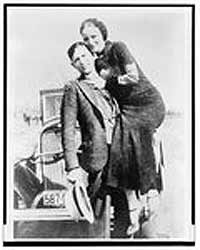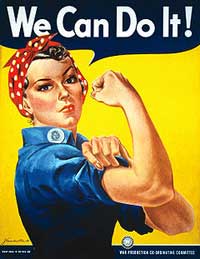Bad Times
The 1930s began with the world suffering through the Great Depression and the American Midwest in particular afflicted by the Dust Bowl. There was massive unemployment, Hoovervilles set up by the homeless, and hobos riding the rails. Resentment towards the banking system led to the 'Public Enemy Era' of romanticized outlaws such as Bonnie & Clyde, Dillinger, and others. Laisseze-faire economics fell out of favor, leading to federal control and regulation of the economy. Franklin D. Roosevelt was elected in 1932, and instituted the New Deal. Just one of many programs he started was the Social Security Act of 1935.
Things Get Worse
The effects of the Great Depression led to a global rise in authoritarian regimes, including Nazi Germany, and led to WWII in 1939; the US entered the war in 1941 after the attack on Pearl Harbor. WWII ended with the dropping of two nuclear bombs on Hiroshima and Nagasaki in August 1945.
Changes
As terrible as WWII was, it also spurred great changes in society. The lack of men on the homefront led to the time of Rosie the Riveter and the first major taste for women in the workplace. Wartime advances in technology as well as the GI Bill led to the Baby Boom, a growing middle class, and more home conveniences. Patriotic sentiment also helped in the integration of black athletes. In boxing, Joe Louis' rematch against Max Schmelling in 1938 became a symbol of anti-Nazi sentiment, and Major League Baseball became integrated when Jackie Robinson signed with the Brooklyn Dodgers in 1945.


